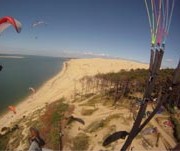French course in Annecy: the perfect preparation for one client’s emigration to France
Cactus student Rob Mepham tells us about his 5-week French course in Annecy and how it has helped him immerse himself in French life.
When Rob Mepham’s feedback came in after his French course in Annecy I knew that I wanted to speak to him. Using words such as ‘my French vocabulary has exploded and grammar improved beyond expectation’, I wanted to find out what exactly had made his experience so good – and pass this on to others considering a similar venture. Now ensconced in his own little corner of France (or not so little, given his 17 acres of farmland), Rob kindly took the time to tell me what had motivated him to learn French and to pass on a few valuable tips about relocating overseas.
Retiring from the military, Rob’s course in Annecy was part of his resettlement training from the Ministry of Defense. An immersion course in France turned out to be considerably cheaper than the equivalent in London – and decidedly more effective, given that it’s in-country. It was also incredibly easy to book, Rob quoting Sandra at Cactus as being particularly efficient in organising his course and replying to every email personally. He chose the chic and pretty town of Annecy in the foothills of the Alps as the location for his studies, with the hope of indulging his passion for paragliding at the same time; the fact that he never actually got to do this became irrelevant as everything was, in his own words, better than he could have imagined.
Once at the school, where he was enrolled on a 5-week elementary French course, Rob could not have found the staff more helpful and patient. He was able to learn at his own pace, aided by the language being spoken slowly around him, and he picked up a vast amount of vocabulary by jotting down new words in class and reading French articles and magazines in his own time.
He was in a class with a mix of nationalities – Chinese, Taiwanese, Mexican, American and Swedish, to name a few – and, most importantly, had no opportunity whatsoever to speak English, meaning that he had to get by and make himself understood in French whichever way he could. The learning curve was steep and he improved dramatically. This was further enhanced by his stay in a host family, where he says he learnt just as much as at the school. His host gave him ample opportunity to practise the language, keeping her speech simple and clear, but she also gave him space to do his own thing – the best of both worlds.
I asked Rob what he thought about learning a language later in life (he is 53), as so many people think that they are too old to learn a language or that classes might be full of teenagers straight out of school. Rob’s class was a fascinating mix of 17-62 year olds and, although he conceded that it depends on the type of person you are, he felt that he had more self-confidence taking a course now. He clearly thrived during his time in Annecy and I found his story even more heart-warming as he claimed to be dreadful at languages at school. It just goes to show that taking a language holiday abroad bears no resemblance to childhood memories of sitting in a classroom at school, too embarrassed to say anything.
Moving on from his experience in Annecy, I was keen to find out more about Rob’s subsequent move to France. I asked him whether he thought knowledge of the language was important in immersing himself in another culture and got a resounding ‘yes’! His 5-week course was perfect as it gave him a good grounding; two or three weeks, he thought, was probably not enough. His French has been invaluable in tasks such as registering his car and sorting out its MOT. He has even found the locals more accepting of him because of his attempts to speak French – I say ‘attempts’ as Rob modestly keeps telling me that it’s far from perfect, but this is exactly the point. People don’t really care how good you are, or not – what they care about is your effort to respect and speak their language, and Rob is a shining example of this.
For others considering relocating abroad, Rob offers a useful piece of advice; it’s good to try to go somewhere where you already know someone. It can be invaluable to have someone who’s already done it answer your questions, especially when it comes to the ins and outs of French bureaucracy. For him, however, the move was extremely easy: he and his wife used a British-based estate agent, which paid for itself with all the hassle avoided. With so many Brits emigrating, they also found internet forums a great source of advice.
I have to admit that what I loved hearing most was how Rob’s course has given him confidence to speak in French to the coach from his local paragliding school, near Limoges where he now lives, and in local shops. Speaking some of the language has undoubtedly made a huge difference to his integration into French life, and I found his enthusiasm and determination utterly inspiring. He hopes to resume his French studies again soon – perhaps at the university in Limoges – and I wish him all the best for that and his future in his new home country.
Cactus specialises in organising language courses for individuals and groups, having done so since 1999 for clients all over the globe and for diverse needs and budgets. With an extensive network of approved teachers and a strong in-house academic team, we are able to tailor a language course to suit your specific learning needs, anywhere in the world and whenever is convenient to you.
We offer French courses in Annecy and in many locations across France and Canada. Evening courses in French are also available in the UK and US. We also offer private and corporate language training for relocation.
The photo at the beginning of this article was kindly contributed by Rob; he took it whilst paragliding at Dune du Pilat, the highest sand dune in Europe, near Bordeaux.






